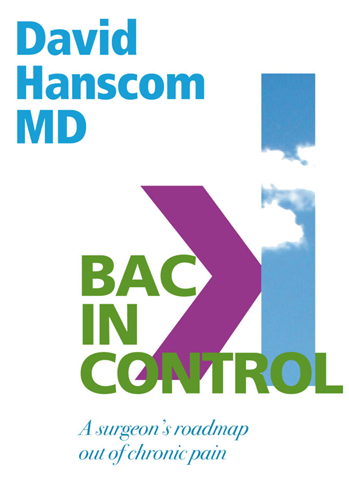Core Books


Back in Control
Seattle spinal surgeon Dr. David Hanscom focuses on an aspect of chronic pain that the medical world has largely overlooked: you must calm your nervous system in order to get better. More than any other book about pain, Back in Control reveals how to quiet a turbocharged central nervous system and make a full recovery, with or without surgery.
Dr. Hanscom shares the story of his own journey out of chronic pain and offers a treatment paradigm that has evolved from his personal experience, as well what he has learned from his patients, hundreds of whom have moved beyond managing pain to becoming pain free. This book will enable those suffering from chronic pain to regain control of their care and life.
This revised 2nd edition reflects the last few years of neuroscience research. It is becoming increasingly clear that the brain processes mental and physical pain in a similar manner. As anxiety drops, pain will diminish. Dr. Hanscom has observed that these principles apply to any chronic pain condition.

Forgive for Good
Forgiving doesn’t mean forgetting, insists Fred Luskin in Forgive for Good: A Proven Prescription for Health and Happiness, nor does it mean condoning bad behavior. What it does mean is that you “take your hurt less personally, take responsibility for how you feel, and become a hero instead of a victim in the story you tell.”
Luskin, a practicing psychologist and cofounder of the Stanford University Forgiveness Project, shows why forgiveness is important for mental and physical health, explains how to form a grievance and suggests practical steps for healing.
He uses examples from his clinical practice including instances of broader cultural grievances like those between Protestants and Catholics in Northern Ireland in this solidly researched and convincing guide.

The Way To Love
This book contains the final flowering of Anthony de Mello’s thought, and in it he grapples with the ultimate question of love. In thirty-one meditations, he implores his readers with his usual pithiness to break through illusion, the great obstacle to love.
“Love springs from awareness,” de Mello insists, saying that it is only when we see others as they are that we can begin to really love. But not only must we seek to see others with clarity, we must examine ourselves without misconception. The task, however, is not easy.
“The most painful act,” de Mello says, “is the act of seeing. But in that act of seeing that love is born.” Anthony de Mello was the director of the Sadhana Institute of Pastoral Counseling in Poona, India, and authored several books.

Getting Things Done: The Art of Stress-Free Productivity
Allen, a management consultant and executive coach, provides insights into attaining maximum efficiency and at the same time relaxing whenever one needs or wants to. Readers learn that there is no single means for perfecting organizational efficiency or productivity; rather, the author offers tools to focus energies strategically and tactically without letting anything fall through the cracks.
He provides tips, techniques, and tricks for implementation of his workflow management plan, which has two basic components: capture all the things that need to get done into a workable, dependable system; and discipline oneself to make front-end decisions with an action plan for all inputs into that system.
In short, do it (quickly), delegate it (appropriately), or defer it. This road map for organizational efficiency may help many who have too much to do in too little time, both professionally and in their personal lives.

Art of Living: The Classical Manual on Virtue, Happiness, and Effectiveness
“Happiness and freedom begin with a clear understanding of one principle: Some things are within our control, and some things are not. It is only after you have faced up to this fundamental rule and learned to distinguish between what you can and can’t control that inner tranquility and outer effectiveness become possible.”
The Stoic philosopher Epictetus was born on the eastern edges of the Roman Empire in A.D. 55, but The Art of Living is still perfectly suited for any contemporary self-help or recovery program. To prove the point, this modern interpretation by Sharon Lebell casts the teachings in up-to-date language, with phrases like “power broker” and “casual sex” popping up intermittently.
But the core is still the same: Epictetus keeps the focus on progress over perfection, on accomplishing what can be accomplished and abandoning unproductive worry over what cannot. –This text refers to an out of print or unavailable edition of this title.


